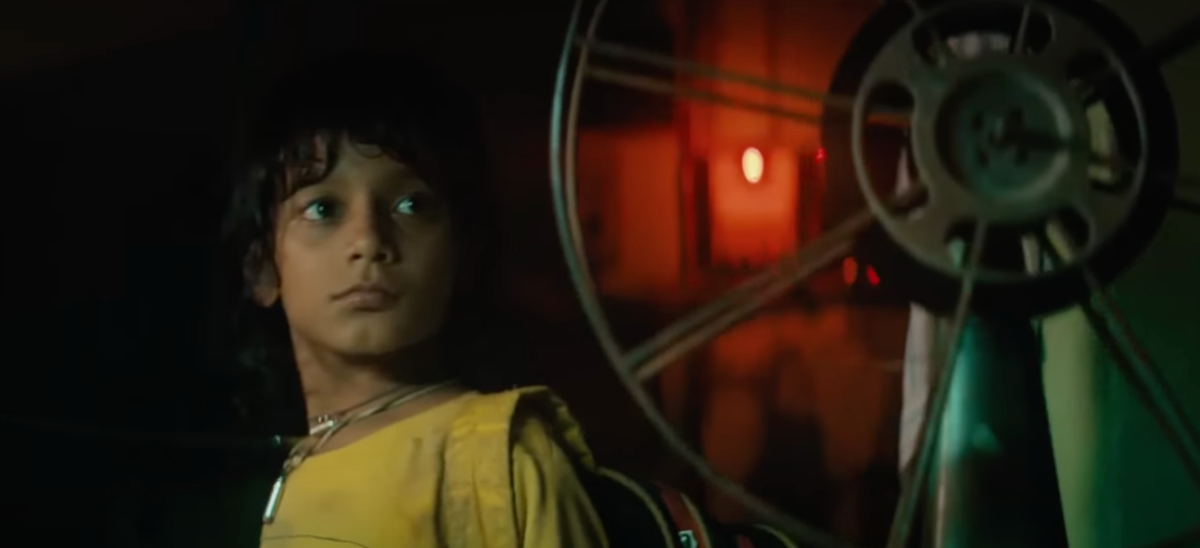Samay (Bhavin Rabari), a nine-year-old boy in the Saurashtra village Chalala, loves movies. But unlike most kids, he’s intrigued by what’s in front and also behind him: the screen and the projector, the cumulative axis of his world. When he watches a mythological drama, Jai Mahakali, with his family, he stands up and gazes at the projector – the flickering lights enchant him. Movies are democratic, but cinephilia, especially in a country like India, largely remains the cushion of the privileged. His father, Bapuji (Dipen Raval), a tea seller at a railway station, forbids him to watch films, saying a Brahmin like him must shun the immoral art form. But nine-year-olds don’t listen; nine-year-olds in love can’t listen.
Pan Nalin’s Chhello Show, India’s official entry to the 95th Academy Awards, opens as a tribute to an innocent childhood. Lush shots of the verdant countryside dominate the frames. The village seems idyllic, cherishing its cocoon. Samay has plenty of time to do nothing. He sneaks into one show, then another. The ushers catch the freeloader and throw him out. One day, he meets a projectionist, Fazal (Bhavesh Shrimali), at a local theatre, Galaxy. They strike a deal: Samay will give him his lunch; Fazal will let him enter the projection booth.
A small town, a young cinephile, and the friendship between a boy and a projectionist. Does this sound familiar? It should – the 1988 Italian drama Cinema Paradiso pivoted on a similar plot. It’s a classic ‘gateway’ film: an accessible arthouse piece marked by a compelling story, nostalgic sentimentality, and (literal) moviemaking magic. Chhello Show does make crucial departures from it — giving the rural Indian cinephilia an enjoyable local spin — but its core often lives under the shadow of the iconic movie.
If the merits of Nalin’s film remind you of Cinema Paradiso, then its flaws are self-made. For a 110-minute drama, Chhello Show finds its narrative momentum and purpose after a long wait. Samay lacks the spark and specificities of a compelling character. He flits from one show to the other – wide-eyed and engrossed – but that superficial curiosity doesn’t plunge to the depth of the question: What draws him towards cinema? The drama continues to wallow in a stagnant plot, revealing little about the boy, making you wonder, “What’s at stake?”
Even the father-son bond seems flat. Whether Samay watches films, skips school, or disobeys his father, Bapuji has the same response: He canes the boy. Fazal and Samay’s relationship isn’t too different either – it’s sweet but doesn’t cut deep. Or what Samay sees in movies. He continues to watch different films, ranging from old potboilers to Jodha Akbar – including a dash of anachronistic vanity: two shots from Nalin’s own film Angry Indian Goddesses (2015) pop up; Chhello Show is set in 2010 – but they don’t leave a lasting emotional impact.
The delayed main conflict, Samay wanting to become a director, also lacks bite. Does a passionate interest in watching movies automatically translate into making them? Obviously not and, barring one scene where he displays the fleeting felicity of a storyteller, that gap, too, is left hanging. Towards the end of Chhello Show, in fact, Nalin seems confused about the story’s main hero and essence. There’s a reason it’s set in 2010. Fazal loses his job when digital projectors arrive in the Galaxy. After that, the movie takes a bizarre misty-eyed turn towards the fading magic of celluloid cinema, becoming a bland public service announcement. Nothing wrong with that message, but it was delivered much more artistically in Shivendra Singh Dungarpur’s Celluloid Man, which released a decade ago.
A few moments of inspired cinematography – such as Samay and his friends admiring the changing shadows of the pastoral landscape on the train wall, as if watching a film, or projecting a movie on his mother’s white saree, through a sewing machine, where they double up as sound designers and voiceover artists – are not nearly enough to sustain interest.
Which brings me to the only notable thing about this movie: its Oscar nomination. The Film Federation of India has had a checkered history of selections – who doesn’t remember The Lunchbox snub – but over the last few years it’s chosen spirited, original films: Court, Visaranai, Newton, Jallikattu, and Koozhangal. Chello Show in comparison is an embarrassing pick, and its inclusion in 2022, in the same year as RRR (which has gotten a thunderous reception in America), makes the decision shameful. Let alone the best Indian film of the year, it’s not even the best movie released this week.
This article was first published on The Wire.

